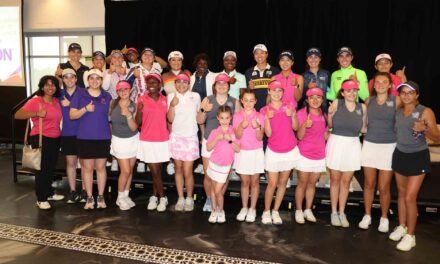
This is the fourth article in NPQ’s series titled Owning the Economy: Stories from Latinx Communities. Coproduced with the National Association for Latino Community Asset Builders, a national network of Latinx community development groups, this series highlights community preservation, land ownership, and business development efforts in Latinx and immigrant communities across the country.
How does a small Latinx community organize itself to support homegrown businesses? Adelante Mujeres (which means Forward, Women), the nonprofit where we work and which has operated for over two decades, seeks to answer this question. Central to this work is developing a holistic support system for Latina1 immigrants and their families in Washington County, Oregon, that can help them build community wealth.
Washington County is the county with the largest Latinx population in Oregon, estimated at 107,000 people (out of a total population of roughly 600,000). Statewide, Oregon’s Latinx population has grown steadily, increasing by 63 percent between 2000 and 2010, and by another 31 percent between 2010 and 2020.
Estimating the size of the Latinx business community is complicated since many Latinx-owned businesses have not been certified as such. But a 2016 report published by the Oregon Community Foundation noted that between 2002 and 2012 alone, the number of Latinx-owned businesses statewide increased from 6,000 to almost 15,500. These businesses, the same report points out, tend to be small. Only one in six has employees other than the owner. Of those that do have employees, the average business employs only seven people. As of 2016, their average wage was only $26,500, far short of the national median income of roughly $59,000 that year.
In short, the community’s Latinx business community is growing, but it is not yet fully thriving. Below, we offer a story of how our local Latinx business community, largely women-led, is learning to organize itself.
Addressing Community Challenges through Business
Immigrant business owners across the United States face many challenges. These include:
- Difficulty navigating the complex system of registering a business and acquiring proper licensing, insurance, and bonding
- Difficulty building relationships with potential clients, vendors, and other professionals because of limited English skills
- Lack of marketing skills and social capital needed to create a strong client base
- Trouble accessing resources such as start-up capital
- Lack of computer literacy and information technology skills
This situation is only worsened by the realities of being a Latina trying to succeed in the US business world. Nationwide, Latinas are typically paid just 55 cents for every dollar paid to White men. According to a 2020 report from the National Women’s Law Center, in terms of lifetime income over a 40-year career, that gap costs the average Latina over $1.163 million. The Latinx immigrants of Washington County are no exception to these trends.
So, how does a small Latinx community organize itself to support its businesses? To be effective, it is critical to employ an equity lens in all our business development work. Promoting equity—by which we mean breaking down the barriers for people of color to live a dignified life—requires active efforts to dismantle racial and structural inequities. It requires specialized support to low-income Latinx microbusiness owners who require business counseling in Spanish, as well as specific resources to build sustainable businesses and create jobs, thereby improving livelihoods for their families and the community overall. This includes:
- Having access to resources that are culturally specific and bilingual in Spanish
- Building strong relationships with local government entities
- Being empowered to participate in leadership opportunities that will support their growth as entrepreneurs and provide an opportunity to have voice and influence on policy, especially in our local communities
Building a Local Entrepreneur Support Network
Since the challenges that [Latinx] entrepreneurs face are multifaceted, meeting those challenges requires combining many different components.
The many needs that Latinx entrepreneurs face, as outlined above, led to the creation of the Empresas Program (empresas meaning businesses). The program was launched by the nonprofit Adelante Mujeres during the Great Recession in 2008. Of the many business owners that we have supported, over 65 percent identify as Latina entrepreneurs.
At Adelante Mujeres, the staff reflects the community served. Over 80 percent of staff identify as Latinx. Our children and their families suffer the impact of generational trauma just as much as their beneficiaries do. The work, in short, is centered not on bringing in experts from afar, but rather on peers supporting peers. Guiding our work is our vision, which is based on six central premises:
1) A healthy, vibrant Latinx community strengthens our society.
2) The empowerment of women is essential for a thriving community.
3) All people have an innate capacity for growth and transformation.
4) Learning leads to a flourishing life.
5) A strong community requires the inclusion of everyone.
6) Everyone has a responsibility to cultivate a peaceful community and a healthy planet.
Sign up for our free newsletters
Subscribe to NPQ’s newsletters to have our top stories delivered directly to your inbox.
By signing up, you agree to our privacy policy and terms of use, and to receive messages from NPQ and our partners.
The work…is centered not on bringing in experts from afar, but rather on peers supporting peers.
To operationalize this vision, Adelante provides technical assistance and limited financing both to startups as well as existing businesses, with a principal focus on supporting Latina entrepreneurs. This is done in coalition with many organizations—local, state, and national—including the Washington County Small Business Support Network and local chambers of commerce, the Oregon Small Business Development Center, and the National Association for Latino Community Asset Builders, among other groups. Through this network of organizations, entrepreneurs are provided with a suite of resources and guidance to help their businesses thrive, from educational courses and workshops that transform an idea into a business plan, direct coaching to put the business plan into action, networking, and access to capital.
Since the challenges that entrepreneurs face are multifaceted, meeting those challenges requires combining many different components. Among these are the following:
- Lending capital: Tools here include the use of matched-savings or individual development accounts, which help microbusiness owners finance more of their business development on their own, as well an affiliated Kiva Zip lending program that offers business owners the chance to obtain up to $5,000 in zero-interest loans.
- Industry-specific capacity: Three industries get specialized support (determined by current entrepreneurial demand). These are the three commercial kitchens that help support food businesses, a retail incubator that offers a storefront called Casa Qui 2 (or “House of Quality”) for Latinx entrepreneurs to sell locally made products, and two farmers market locations to support local producers.
- Wraparound support: This includes adult education, leadership development, education programs, nutritional education, and mental health assistance.
How does this all work in practice? Here are a couple of examples:
Olga López is one of the many Latina business owners that Empresas has supported. She had comanaged a business with her husband for 19 years, but when she and her husband divorced, López was left without a business or income—and her home was at risk of foreclosure. Business training enabled López to get back on her feet, and she set up her own cleaning business. Called Royalty Maid Services, this business has now taken off. The small business maintained all but one client account during the pandemic, a major achievement given that domestic cleaning work largely dried up in 2020 when the economy shut down.
Now López uses her leadership and empathy to drive the business. Many of her employees are mothers. López, in managing the business, has ensured that her employees have the flexibility in their scheduling that they need. This has enabled her to retain a largely Latina workforce in a growing business that both provides decent jobs while enabling employees to have healthy, quality time with their families.
Another team of Latinx business owners in our community are Alma Hernández and her husband Christian Morales. Both immigrated to Oregon from Mexico. In 2020, they started to sell their products and foodstuffs in local farmers markets in the Washington County communities of Forest Grove and Cornelius.
Looking to expand and develop a permanent storefront, they participated in the food business course. Now they have a storefront which they call La Loteria Taco Shop in North Plains; they also operate a food truck.
These are just two of many examples. In 2021, 105 people sought technical assistance support; businesses receiving support saw a 22 percent increase in revenues and technical assistance support led to 20 new businesses being formed.
Developing Community Leadership
Entrepreneurs play a critical role as community builders. But aligning economic development with community development requires more. For this reason, Adelante works with Latinas in the community to increase civic engagement, supporting community-led efforts to address unjust and deficient policies at their roots. For example, in coordination with Bienestar Oregon, Centro Cultural, Community Action, DREAMers Resource Center, SOAR Immigration Legal Services, and the Virginia Garcia Memorial Health Center, Adelante participates in a coalition that we call our immigrant solidarity program. All immigrant community support volunteers (also known as promotores) receive a seven-week training course and then support immigrants in the field.
More broadly, in 2022, Adelante launched a new policy program, focused on both advocacy and, critically, leadership development. This new effort was spurred by the growing recognition in our community of how critical it is to have Latina voices at the table in decision-making roles to counter the structural racism and sexism that our community faces. There is so much knowledge in the Latinx community that needs to be elevated.
Technical assistance work often takes place business by business, but our dreams extend much further—far beyond supporting businesses.
This work, however, cannot be done alone. There is direct support provided by government agencies and foundations who are working with Adelante to promote culturally responsive information and equitable bilingual access to Latinx entrepreneurs. Most important in all of this, however, are the members of the Latinx community in Washington County themselves, who build power and community by exchanging experiences, recommending services to one another, and supporting each other through the confusing and even scary steps of embarking on a business and negotiating their way as immigrants in a society that can often be hostile to them.
Building Community Wealth
The work of community building and of building community wealth is complex. Some of this work involves group advocacy and community building activities. Other parts of the work are much more individualized.
By necessity, technical assistance work often takes place business by business, but our dreams extend much further—far beyond supporting businesses. In our work, we are motivated to build toward a future where people of color, immigrants, refugees, and rural residents are leaders who advance systemic change to build a truly just society.
This vision is reflected in how we conduct our entrepreneurship trainings. In our trainings, we speak not only of a triple bottom line of planet, profit, and people—but of a quadruple bottom line of planet, profit, people, and purpose.
The purpose of business development, simply put, is not just to sell more goods and services, but to sustain our cultures and develop a thriving community that generates health, income, and wealth for all. Together, our vision for the Latinx business community in our small corner of Washington County, OR, is to continue to engage with business owners, organizational allies, and community leaders to build the just and caring society that we all desire.
Notes
- We use Latina to refer to women of Latinx descent. Otherwise, we use the gender-neutral term Latinx.
- The name combines the Spanish word for house (casa) and the Nahuatl word for quality (qui).





